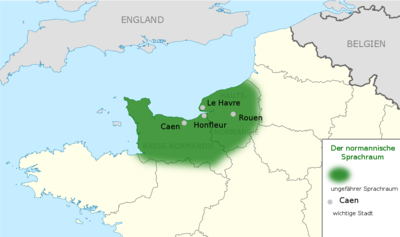Norman language: Difference between revisions
Pat Palmer (talk | contribs) No edit summary |
mNo edit summary |
||
| Line 64: | Line 64: | ||
}} | }} | ||
</ref> | </ref> | ||
}} | }}[[Category:Suggestion Bot Tag]] | ||
Latest revision as of 16:01, 26 September 2024
The Norman language, sometimes called Norman French, is a Romance language, that was influenced by Norse and Breton. It is one of the langues d'oïl, like the French language and the Walloon language. Jèrriais, Guernesiais, Sercquiais, and Auregnais, from the islands of Jersey, Guernsey, Sark and Alderney diverged from the Norman language after the English kings lost their Norman territories on the French mainland in the 13th century.[1] After Duke William of Normandy conquered England in 1066, this language became the language of the aristocracy and many official documents for centuries. Even today, on occasions when Royal Assent is given to Acts of Parliament in the House of Lords, the Clerk announces it, in most cases, in the words "Le roi le veut", mean "the kind wills it". A large proportion of English vocabulary is also from this source.
References
- ↑ Jèrriais: Jersey's traditional language. Retrieved on 2022-08-18.
